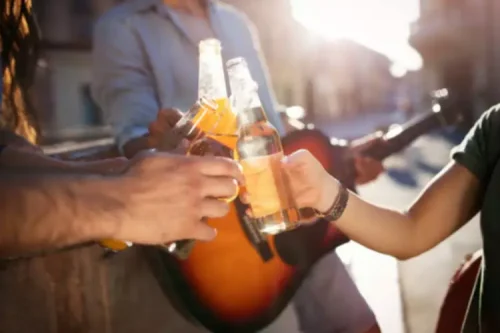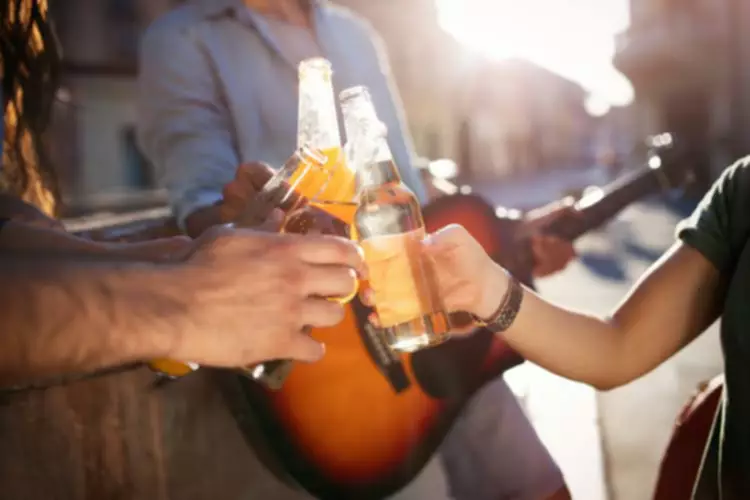
Drinks with higher alcohol content, including vodka, whiskey, and rum, can have a stronger dehydrating effect than beverages with lower alcohol content, such as beer or wine. Alcohol interferes with the brain’s ability to control body temperature. If you drink alcohol on a hot day, your body won’t be able to adjust and control your internal temperature effectively, which increases the risk of heat stroke. While it can be tempting to consume alcohol on a hot summer day, the combination of high temperatures and alcohol can cause considerable fluid loss and dehydration. A high-potassium electrolyte powder containing at least 1,000 milligrams of potassium can help counteract fluid loss caused by alcohol and reduce the risk of having a hangover.

Stay updated
Significantly high levels of caffeine intake may https://ecosoberhouse.com/ contribute to dehydration by stimulating the body to release more liquid than usual. Some people may also pair liquor with other drinks and ingredients in mixed drinks. Drinks with high sugar content or caffeine combined with liquor in mixed drinks can make symptoms worse for some. In addition, certain types of energy drinks contain other ingredients that could contribute to dehydration.
Beer and cider
Research from how can alcohol, a liquid, dehydrate the body? 2017 indicates that low levels of caffeine ingestion do not cause dehydration. Participants who consumed over 500 milligrams (mg) of caffeine daily showed disruptions in fluid balance from the diuretic effects of coffee. In particular, it’s best to enjoy caffeinated energy drinks and alcohol in moderation and consume them alongside water to stay properly hydrated. Moderating your intake of the beverages listed above and drinking plenty of water can help prevent dehydration. Listening to your body and learning to recognize signs of dehydration can also be beneficial.

Drink responsibly
The extent of these effects and how long they last may vary. Energy drinks may contain a combination of dehydrating ingredients. They generally contain high levels of caffeine and sugar and may contain other added ingredients that stimulate the kidneys and act as a diuretic. Drinking 2–3 cups of coffee a day may be an acceptable practice to maintain moderate coffee consumption. An increased intake of coffee may cause a diuretic effect that promotes dehydration. Hydration is the process of ensuring the body has enough water.

What Is the Best Way to Rehydrate After Drinking?
Alcohol decreases the amount of ADH your body produces, making it harder to retain enough fluids. The higher the alcohol content, the greater this effect will be. Fortunately, researchers have discovered these effects are not sustained over multiple drinks. How long it takes to rehydrate after drinking depends on how much alcohol you have consumed and how much fluid volume and electrolytes your body lost.

Blood Alcohol Concentration (BAC)
Dr Karl explains why, if you’re drinking booze, what goes in is not equal to what comes out. Additionally, many teas may also contain high levels of sugar from sweetened milk, sugars, or syrups, which may not be the most hydrating for quenching thirst. In another study, thirsty adults perceived a cold carbonated beverage to be more thirst-quenching than water. When you’re feeling thirsty or dehydrated, reaching for a refreshing beverage may seem like common sense.
Why does drinking alcohol cause dehydration?
- Drinking caffeinated beverages such as coffee, tea, sodas, energy drinks, and certain sports drinks won’t have a hydrating effect and may contribute to dehydration.
- The Brown University Health Blog Team is working to provide you with timely and pertinent information that will help keep you and your family happy and healthy.
- This is likely because of the interaction of sugar and water within the cells.
- In order to break this substance down and remove it from the body, your liver does most of the work of turning it into acetate.
- Your specific hydration needs may depend on factors like your activity levels, body weight, and the environment in which you live.
Alcohol restricts blood vessel dilation and increases heart rate, which explains why drinking can cause arrhythmia and elevated blood pressure. Sodium is an electrolyte mineral found in many foods, and most people obtain adequate amounts from table salt. Dehydration occurs when fluid loss is greater than fluid intake. These foods also benefit from being easy on the digestive system if a person is upset Oxford House from drinking too much alcohol.
